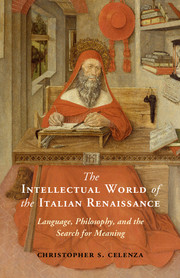'In The Intellectual World of the Italian Renaissance, Christopher Celenza provides a priceless vademecum for the study of Italian humanism. It rolls up in a delectable ball all that has come before: Garin and Kristeller; Burckhardt, Baron, and Martines; Fubini and Vasoli; Hankins, Allen, and the others. It presents in depth and with exquisite clarity the major works of nine leading humanists from Petrarch to Poliziano (plus many others introduced in discursive 'parentheses'), culminating with the writer and critic Pietro Bembo, who translates the humanist heritage into a new language of art, a Latinized Tuscan. The lucidity of the explication de textes is matched by the precision with which Celenza profiles his cast of characters, who are presented with full dimensionality in their psychological, social, and cultural contexts: the careerist Poggio, the brawler Valla, the self-made man and Medici servitor Poliziano.'
Margaret L. King
Source: The Catholic Historical Review
'This is an immensely learned book, written in a clear, accessible style and rich in insight and understanding. Celenza has followed the currents of language and philosophy - which he defines, as do his sources, as the love of wisdom rather than a defined discipline - as elements in the search for meaning and hence self-knowledge and shared values. It is the ideal place to begin a journey into the ideas and debates that informed the intellectual world of the Italian Renaissance.'
Kenneth Bartlett
Source: American Historical Review
'… Celenza presents a rich analysis and narrative of what it meant to participate in Renaissance Italian intellectual life. I recommend his book - either as a whole, or individual chapters as essays - to undergraduates studying intellectual life during the Florentine Renaissance, or to graduate students and early researchers, as a robust and very clear introduction to Renaissance intellectual life and Renaissance humanism.'
Barry Torch
Source: Renaissance and Reformation / Renaissance et Réforme
'The Intellectual World of the Italian Renaissance offers an accessible synthesis of intellectual history in Italy from Petrarch to Pietro Bembo … This book will become the standard introductory text to the subject for students, while specialists will also find here a well-written and thoughtful account of a topic that so often defies synthetic treatment … Historians and students of thought, culture and society, as well as literary scholars and students will all find much to ponder here.'
Brian J. Maxson
Source: H-Net reviews
'This is an immensely learned book, written in a clear, accessible style and rich in insight and understanding.'
Kenneth Bartlett
Source: The American Historical Review
'This is a rich and engaging study. Not a history of Renaissance philosophy as such, it is, rather, an examination of the intellectual worlds of the fifteenth century and in particular of the dominant role of Latin.'
Michael J. B. Allen
Source: Renaissance Quarterly





